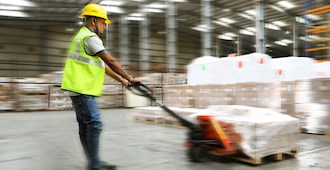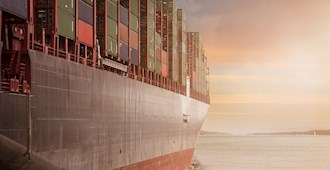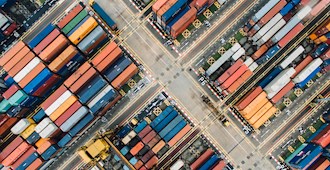Logistics and Transportation: Similarities & Differences

What is the Difference Between Logistics and Transportation
With the advancement in science and rise in per capita income, the availability of goods and purchasing capacity has increased manifold in the last few decades. The tremendous rise in e-commerce logistics and demand for luxury products has enhanced cross-border trade. Growing demand for products by the consumer and quick delivery expectations has promoted manufacturers to use the latest technologies to increase their production and precision along with ways to facilitate timely deliveries. Global supply chains are working tirelessly to meet the ever-growing consumer demands. Proven scientific methodologies are implemented for optimised supply chain processes and decrease wastage and errors.
Being an important element of the supply chain efficiency, logistics and transportation has also evolved in a very short span of time. Efforts are made to increase the efficiency of the logistics industry for the quick supply of raw materials, material handling and shipping of the finished products to the consumer. Transportation being the subset of logistics has also come a long way. It has matched the fast-paced consumer market with upgradation in transportation methodologies, means of transportation, and vehicle carriers.
There is tremendous potential in the logistics transportation industries. Established as well as new players are entering the domain with each passing day. This has given rise to a competitive scenario, with a race to attract customers through the quality of service. Logistics companies are using advanced technologies and sophisticated software to optimise their operation and sustain the fierce competition.
But what is the difference between logistics and transportation? Let us dive deep into the two concepts of Logistics and Transportation and see the similarities and differences between the two.
Although synonyms, logistics and transportation are completely different things in a supply chain. In layman's language, transportation is only the moving of goods from one point to another whereas logistics encompasses transportation along with the planning of transportation, its means, storage, distribution, last-mile delivery and all other processes involved in taking a product or service from the manufacturer to the end-user.
Logistics
What is logistics? Logistics is the process of obtaining raw materials, processing them and delivering finished products to customers or end users. It involves the planning of inward and outward transportation activities, procurement of raw materials, managing the storage of finished products and handling deliveries to the consumers. It also takes care of reverse logistics if the products are returned by the customer in case a damaged or wrong product is delivered to them.
Other functions of logistics that are different from transportation are managing the packaging of the products so that the products reach the end-users in the best condition. Containerization of the goods before being shipped via different modes of transportation and handling documentation required for shipping to international destinations. It calculates different taxes, duties and cesses for the import and export of goods according to the destination. Logistics operations also involve insuring the goods and assisting in claim settlement in case of any unforeseen event.
Another activity under logistics management is forecasting the demand for certain products according to the available data, time of the year and market sentiments. It helps in planning production and inventory management. Packaging is an important part of transporting goods, especially to a foreign destination. The packaging must be robust and leakproof so that the products inside remain intact and reach the customers' safety, it reduces the chances of products being returned or rejected.
In other words, the logistics management starts right after an order is placed till the order is fulfilled and continues after that too. It takes care of customer care and issues in delivery or delivered products if any. It is important as customers who are satisfied tend to reuse the products and services.
Transportation:
Transportation in the supply chain as mentioned above is nothing but moving goods from one place to another. It is more or less the execution part of the logistics transportation planning. Transportation is an important part of logistics management, hence its efficiency increases the efficiency of the entire system. With proper management and executive, the logistics cost or transportation cost for freight reduces substantially.
There are different modes of transportation by which goods can be moved from point of origin to the point of consumption. These modes are road, rail, air, water, cable and pipelines. Different modes are used for the transportation of different materials. Many times movement of freight depends upon the geographical location, nature of the cargo, its weight, time and the cost involved.
Advanced transportation technologies are developed and incorporated into the transportation industry to make the operation more efficient and economic. Driverless technology is one of them. It will be used for freight transportation done by trucks via roads. The specialised trucks could carry goods loaded up to the predefined destination with the driver. These self-driven trucks are a promising solution to numerous problems faced by drivers and company owners. Driverless trucks have high fuel efficiency as they are driven automatically with optimum and steady speed. The chances of accidents are also none as there is no human interference and the truck is driven by high-end technologies. It ensures timely delivery as there are no delays caused by the unavailability of drivers or breaks taken by them. Driverless eliminates the problem of scarcity of skilled drivers and helps in logistics cost reduction.
Another technology used in the transportation industry is drone technology. Drones are powered by artificial intelligence which is capable of delivering packages to the defined location accurately. It is useful in last-mile deliveries and is a boon for the e-commerce industry. It has minimised the use of small vehicles or bikes for parcel delivery and thus reduced fuel consumption and population. It has reduced labour costs to a great extent and reduced logistics costs as well.




